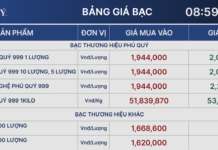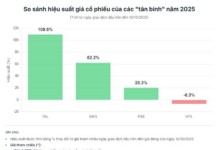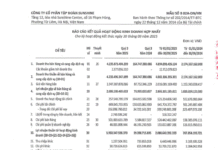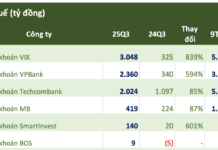Reporter: The amended Power Law, which will take effect on February 1, 2025, has some new points regarding electricity price management. Can you elaborate on this, Mr. Hòa?
– Mr. TRẦN VIỆT HÒA, Director of the Electricity Regulatory Authority of Vietnam – Ministry of Industry and Trade: The electricity pricing policy in the amended Power Law has institutionalized Resolution 55-NQ/TW of 2020 by the Party Central Committee on the orientation of energy development towards 2030, with a vision to 2045. It also legalizes electricity price management by stipulating the mechanism for adjusting the average electricity selling price, changing it from a “Decision of the Prime Minister”, as stipulated in the current Power Law, to a “Decree of the Government”.

The amended Power Law stipulates that retail electricity prices should be adjusted promptly to reflect the actual changes in input parameters, covering reasonable and legitimate costs with a reasonable profit to preserve and develop the business capital of enterprises, in line with socio-economic conditions and the level of the competitive electricity market. The Government is entrusted with issuing detailed regulations to ensure flexibility in implementation.
By entrusting the Government with issuing regulations as mentioned above, it is possible to both set out the principle of adjusting retail electricity prices in line with market fluctuations and ensure unity in macroeconomic management (as electricity prices are one of the factors affecting the macroeconomy) and other balances in the socio-economic life.
In addition, the Government’s Decree will provide more specific regulations on some contents, such as reasonable profits, electricity price adjustment time, etc., creating a legal basis for practical implementation.
Many people have long been concerned about electricity prices only increasing and not decreasing. With the new price management mechanism under the amended Power Law, can electricity prices be reduced?
– The current Power Law stipulates that electricity prices should follow a market mechanism with state regulation, suitable for the level of development of the electricity market and the mechanism for adjusting the average electricity selling price, which is concretized in Decision 05/2024/QD-TTg of the Prime Minister (replacing Decision 24/2017/QD-TTg).
Electricity price adjustments are considered based on objective fluctuations in input parameters from the stages in the electricity production and supply chain, other costs not yet included in electricity prices, and profits on owner’s equity directly serving the production and supply of electricity by the Vietnam Electricity Group (EVN).

Hanoi Electricity staff maintaining and repairing the electricity system. Photo: LÊ THÚY
Accordingly, when the average electricity selling price decreases by 1% or more or increases by 3% to less than 5% compared to the current price, EVN decides to adjust; an increase of 5% to less than 10% will require the Ministry of Industry and Trade’s opinion for EVN to adjust; an increase of 10% or more or affecting the macro-economy will require the Ministry of Industry and Trade to report to the Prime Minister for consideration and direction.
With the new regulation stipulated in the amended Power Law – retail electricity prices are adjusted promptly to reflect the actual changes in input parameters… The policy of managing electricity prices in line with market fluctuations is further affirmed.
Thus, with the current regulations, electricity prices can increase or decrease, depending on the fluctuations in input parameters. However, electricity price management is one link in the overall macroeconomic management of the Government and the Prime Minister. Therefore, at certain times, to ensure macroeconomic stability and other balances, the Prime Minister directs the stabilization of electricity prices, leading to electricity prices not fully reflecting the changes in costs (with a tendency to increase compared to the previous period).
With the new regulation stipulated in the amended Power Law – retail electricity prices are adjusted promptly to reflect the actual changes in input parameters… – the policy of managing electricity prices in line with market fluctuations is further affirmed.
In the coming time, the Government will issue a decree to replace Decision 05/2024/QD-TTg on the mechanism for adjusting the average electricity selling price to improve the practicality in electricity price management. At that time, the fluctuations in input parameters – such as fuel prices, electricity output structure, and exchange rates – will affect the increase or decrease of the average electricity selling price.
Mr. Hòa, to manage electricity prices in accordance with market mechanisms, it is necessary to accelerate the development of a competitive retail electricity market, isn’t it?
– Building and developing a competitive electricity market, in general, and a competitive retail electricity market, in particular, is one of the important policies of the Party and the Government.
According to Decision 63/2013/QD-TTg, when the necessary and sufficient conditions are met, Vietnam has been gradually implementing the competitive electricity market at different levels. The country is currently in the stage of the wholesale electricity market. The transition to a competitive retail electricity market is a complex process that requires thorough preparation in many aspects and the fulfillment of prerequisite conditions.
Up to now, although the electricity generation and wholesale market has been operating for more than 12 years, the level of competition is still limited. To move to the stage of a competitive retail electricity market, it is necessary to address core and important issues such as restructuring the electricity industry; reforming retail electricity prices (eliminating cross-subsidization); separating the distribution and retail stages, and building infrastructure to meet operational requirements.
With the amended Power Law recently passed, in the context that Vietnam may face the risk of an electricity supply-demand imbalance in the coming years, the roadmap for developing a competitive electricity market, in general, and a competitive retail electricity market, in particular, needs to be reviewed and adjusted appropriately to ensure feasibility and effectiveness.
One of the steps towards a competitive retail electricity market is that the Government recently issued Decree 80 on the mechanism for direct electricity purchase between renewable energy generators and large electricity users. However, in reality, many customers are still unable to buy electricity directly. Why is that?
– Allowing large electricity users to sign direct power purchase agreements (DPPA) with renewable energy generators is a new and important initiative in Vietnam.
DPPA has been of great interest to many organizations and individuals, who have been looking forward to its early issuance by the Government; the potential and demand for participating in this mechanism are also large. However, the implementation of DPPA still faces some challenges, such as the need for adaptation to its novelty; agreements, contracts, and costs; insufficient supply to meet immediate demand and financial capacity.
The Electricity Regulatory Authority of Vietnam has advised the Ministry of Industry and Trade to direct EVN, the National Power Transmission Corporation, and the Vietnam Electricity Market Company (NSMO) and its affiliates to urgently complete and announce related contents. These include participation costs in DPPA (system service charges, settlement of differences in payment); amendment and promulgation of business processes and internal regulations; development of a governance process for registration to participate in the mechanism, and guidance for units to confirm, reconcile data, and calculate payments for electricity volumes traded…
The Ministry of Industry and Trade will continue to review, complete, and promptly submit to the competent authorities for issuance of other necessary regulations to enhance the efficiency of DPPA participants. To successfully implement this mechanism, close coordination between state agencies, enterprises, and the people is needed.
Review and propose adjustments to Power Development Plan VIII
According to Mr. Trần Việt Hòa, the demand for purchasing green and clean electricity through the DPPA mechanism is increasing. However, the current supply cannot meet the demand as the scale of rooftop solar power has reached the limit of 2,600 MW set by Power Development Plan VIII for the rooftop solar power mechanism for self-consumption. Meanwhile, large-scale renewable energy projects require time to implement.
In the past time, the Ministry of Industry and Trade has requested its units to implement the review, evaluation, and proposal of adjustments to Power Development Plan VIII. This is to timely supplement the development goals for renewable energy, especially rooftop solar power, to create more potential for participation in DPPA, especially the model with a separate connection line.





































